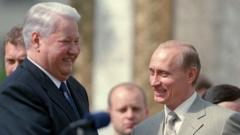Vladimir Putin has been in power for 25 years, a tenure marked by significant political changes, military conflicts, and economic challenges. As the conflict in Ukraine continues, questions arise about whether he has fulfilled Boris Yeltsin's directive to "take care of Russia." Analysts argue about the implications of Putin’s leadership style and the factors that have shaped his decisions.
Assessing Putin’s Legacy: Has He Truly 'Taken Care of Russia'?

Assessing Putin’s Legacy: Has He Truly 'Taken Care of Russia'?
As Vladimir Putin marks 25 years in power, experts weigh in on his governance and the impact of his policies, particularly in light of Russia's war in Ukraine.
In the final hours of 1999, Russia witnessed a dramatic transition as President Boris Yeltsin announced his resignation, paving the way for Vladimir Putin to ascend to power. Looking back on the past quarter-century, it is essential to critically evaluate whether Putin has met Yeltsin's last request to "take care of Russia."
Since Putin's rise, his leadership has been characterized by a mix of assertiveness and turmoil, particularly as Russia has faced severe consequences stemming from its ongoing military involvement in Ukraine. The impact of this “special military operation” has been catastrophic, not only for Ukraine—with significant territorial losses and civilian displacements—but also for Russia. The country has endured heavy casualties, damaging drone attacks, and economic sanctions that have placed immense strain on its economy.
The effects of the prolonged conflict have led to critical questions regarding Russia's demographic and social landscape. Observing Putin's governance from the onset reveals a transformation in his approach to leadership. Notably, former NATO Secretary-General Lord Robertson remarked on the stark contrast between the cooperative Putin of the early 2000s and the current iteration, who is perceived as increasingly isolated and aggressive.
As analysts reflect on this trajectory, they speculate on how different Russia might have been had another leader succeeded Yeltsin. Nevertheless, contemporary Russia is shaped significantly by Putin’s ambition to reassert its independence on the global stage. He often speaks to the perceived historical grievances against the West regarding Russia's sovereignty, painting his policies as necessary responses to external threats.
In light of these discussions, a recent exchange during a lengthy press conference revealed Putin's perspective on his leadership. When confronted with concerns about losses due to the Ukraine war, he asserted that he had safeguarded Russia, claiming to have pulled "back from the edge of the abyss." This portrayal positions him as the defender of Russian sovereignty, although the implications of such beliefs merit scrutiny.
As Putin continues to assert his narrative, it remains unclear whether he genuinely believes he has adhered to Yeltsin's directive. The answer to this question holds significant weight not only for understanding Putin's legacy but also for the future direction of Russia amidst ongoing conflict. As the war drags on, one is left pondering the repercussions of his rule and the broader implications for Russian society.



















